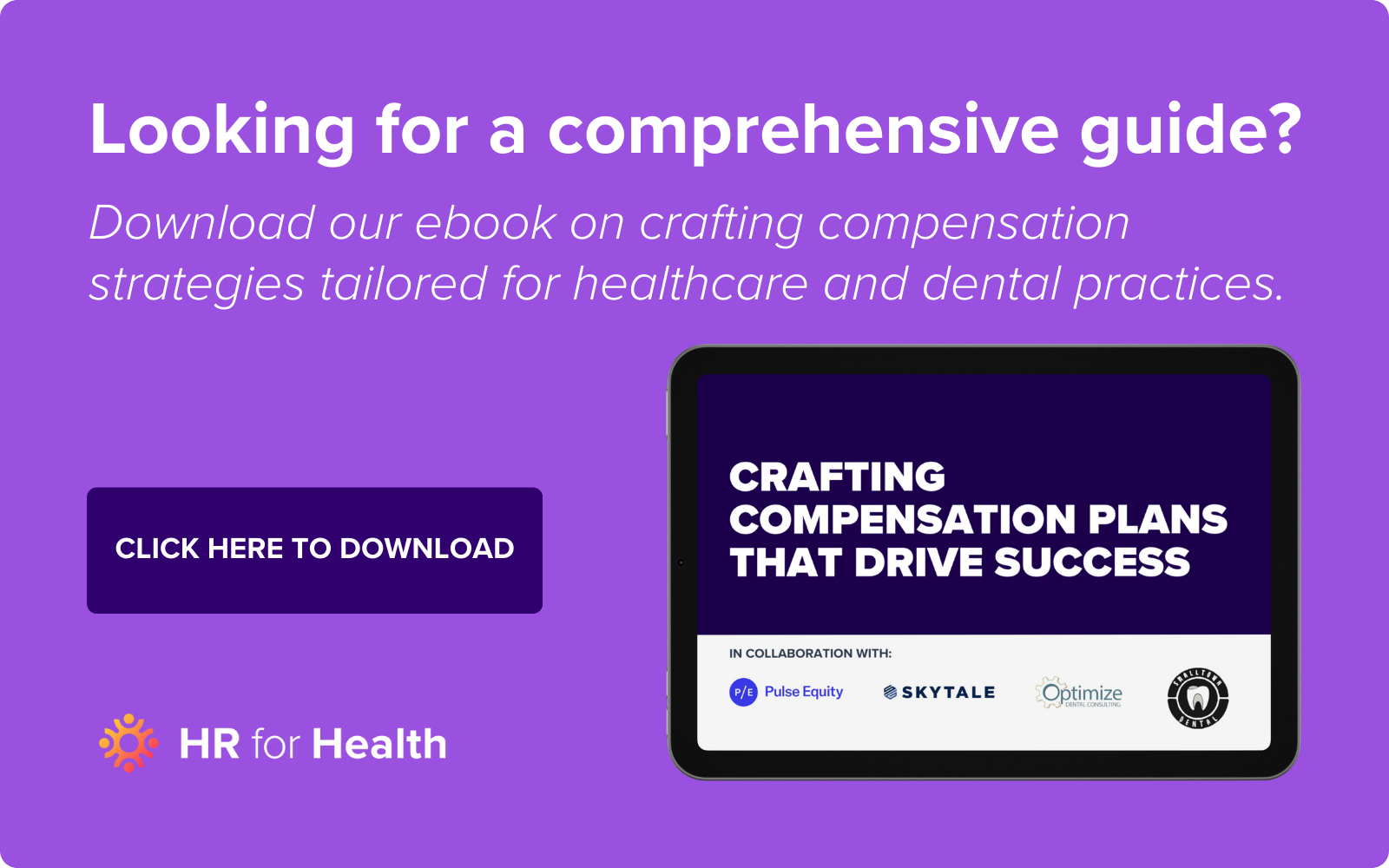A thoughtful compensation strategy goes beyond paychecks—it’s an investment in your practice’s growth and team retention. For healthcare and dental practices, an effective plan includes aligning compensation with performance metrics, ensuring compliance, and offering competitive benefits. Our recent webinar, featuring industry experts from various fields, shared strategies for building compensation plans that reward performance, promote transparency, and strengthen teams. Here, we summarize key insights from each speaker to help you create a compensation strategy tailored for your practice.
Ready to dive deeper? Watch the full webinar recording for in-depth insights from industry experts on building high-performance compensation plans!
Empower Employees to Feel Like Owners
Eric Pastan, Director at Skytale Group
Eric Pastan, with his extensive experience scaling DSOs, emphasized the importance of empowering employees with a sense of ownership. Aligning compensation with practice success encourages team members to invest in the practice’s vision. This “ownership mentality” can lead to better patient care, lower turnover, and stronger outcomes across the board. Eric recommends linking incentives to shared goals, so employees can see their contributions directly impact the practice’s success.
To support this ownership mindset, Eric highlighted the need for straightforward, transparent compensation plans that align personal goals with the practice’s financial health. Practices can foster this mentality by offering team-based bonuses, sharing revenue metrics, and providing clear growth pathways.

Addressing Key Challenges in Dentistry
Dental practices today face historically high labor costs, increased supply prices, and high interest rates, which all affect profitability. Eric noted that these factors place pressure on practices to manage their costs efficiently and optimize their compensation structures to balance profitability with team engagement. Establishing smart compensation plans can help alleviate some of these financial challenges by motivating employees to perform at a higher level, driving revenue, and reducing expenses.
Looking for a comprehensive guide? Download our ebook on crafting compensation strategies tailored for healthcare and dental practices.
Structuring Effective Compensation Components
A balanced compensation plan typically includes multiple components: base pay, performance-based bonuses, and even equity options in some cases. Eric shared how compensation structures that incorporate bonuses or equity-sharing can enhance motivation, improve retention, and align employees with the practice’s broader financial goals.
Creating Transparency and Motivation
Vanessa Buchheit, Chief Operations Officer at Smalltown Dental
Vanessa Buchheit, who brings nearly two decades of experience in dental operations, emphasized the need for transparency and support in compensation structures. According to Vanessa, a great compensation plan is about 10% the financial package and 90% the rollout and communication. Clear communication around compensation fosters trust and loyalty within the team. Vanessa shared examples of how Smalltown Dental has successfully integrated bonus incentives, performance tracking, and a supportive environment to motivate teams.
At HR for Health, our customizable performance review templates can help practices standardize their review process, aligning compensation conversations with transparent goals. When combined with our violation management, notes, and CE tracking features, practices have the tools to maintain a fair, supportive work environment that recognizes individual contributions.
Ready to build your own plan? Download our compensation plan template and start aligning your practice’s goals with performance metrics.
Performance-Based Compensation and Productivity
Jill Nesbitt, Founder of Optimize Dental Consulting
Jill Nesbitt shared insights on the benefits of performance-based compensation, drawing from her experience helping DSOs and multi-location groups optimize their software and compensation structures. Performance-based incentives, when designed effectively, can drive engagement and align team goals with practice growth. Jill’s approach to creating clear, role-based performance metrics helps practices establish fair compensation that motivates employees to achieve set goals.
HR for Health supports performance-based compensation through tools like:
- Customizable Performance Review Templates: Set specific performance metrics that align with practice goals and make it easy to measure success.
- Violation Management and Notes: Keep detailed records of performance issues, ensuring consistency and fairness in reviews.
- CE Tracking and Alerts: Track and remind team members of their certification needs, ensuring compliance and professional development.
This combination of tools not only promotes fairness but also supports a culture where each employee feels empowered to excel and contribute to the practice’s success.

Competitive Benefits to Retain Talent
Matthew McGaw, Head of Growth & Strategy at Pulse Equity
Matthew McGaw highlighted the critical role benefits play in today’s compensation landscape. In a competitive market, employees value benefits that support their health, development, and work-life balance as much as a competitive salary. From continuing education support to flexible scheduling and mental health resources, a strong benefits package can make a significant difference in retention.
Matthew emphasized that offering a well-rounded package, including non-monetary benefits, is key to building a workplace where employees feel valued. By integrating benefits management with HR for Health, practices can ensure their teams receive comprehensive support without overwhelming HR staff with administration.
Meet the Experts Behind the Strategies
Each of our speakers brought invaluable experience and industry insights to help you craft a compensation plan that aligns with high-performance goals. Here’s a look at each speaker and their unique contributions:
- Vanessa Buchheit, Chief Operating Officer at Smalltown Dental
With nearly 20 years in the dental industry, Vanessa has worn many hats—from front desk receptionist to Chief Operations Officer. Her experience in building high-performing teams, optimizing patient interactions, and driving growth has equipped her to lead Smalltown Dental’s success. She emphasizes that a successful compensation plan is about more than pay—it’s about support, transparency, and creating an environment where every team member feels valued and motivated. - Eric Pastan, Director at Skytale Group
Eric’s career includes building the largest Dental Services Organization (DSO) in New England, employing over 350 dental professionals. Now at Skytale Group, Eric helps businesses strategize through critical growth stages, focusing on systemization, purchasing, hiring, and M&A. His deep understanding of compensation as a tool for instilling ownership mentality in teams has made him a trusted advisor for practices looking to scale sustainably. - Jill Nesbitt, Founder of Optimize Dental Consulting
Specializing in practice management software implementation, Jill has helped hundreds of dental practices standardize and optimize their operations. Her firm, Optimize Dental Consulting, provides a change management-focused approach that supports multi-location groups and DSOs in successfully adopting new compensation structures. Jill shared insights into how practices can empower their teams through bonus structures, performance roadmaps, and regular feedback, fostering a results-oriented culture. - Matthew McGaw, Head of Growth & Strategy at Pulse Equity
As a go-to-market strategist with over 20 years of experience, Matthew focuses on aligning clinician incentives with enterprise goals at Pulse Equity. His expertise in driving EBITDA growth through strategic compensation adjustments underscores the financial impact of well-aligned compensation plans. Matthew highlighted the importance of showing clinicians the direct effect of their work on both practice profitability and personal financial outcomes.
Each speaker’s perspective provided crucial insights into creating compensation strategies that support a thriving, engaged team while driving practice growth.
Conclusion:
Designing a fair, transparent, and motivating compensation plan can transform your practice’s culture, engagement, and retention rates. From tracking performance to simplifying compliance, HR for Health provides the tools you need to create a strategy that drives success and rewards hard work. Ready to explore how our solutions can help streamline your compensation strategy? Reach out to schedule a demo today!


